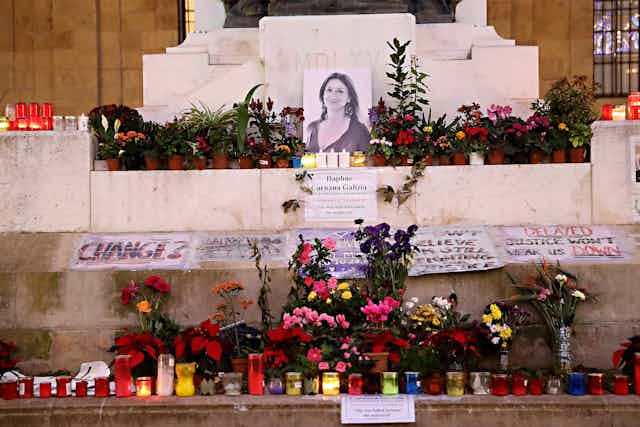Daphne Caruana Galizia was Malta’s best known and most widely-read investigative journalist. She used her blog Running Commentary to publish exposés on corruption among Maltese politicians and public officials, often targeting members of the ruling Labour Party. She picked up both admirers and enemies and continues to be a controversial figure, even after her murder. In 2017, Chris Cardona, the economy minister, called Caruana Galizia “a blogger that publishes unfounded lies, intended to break people”.
Soon after Caruana Galizia’s death in October 2017, three men suspected of being contract killers were detained and brought before a magistrate for pre-trial proceedings. But it took until July 2019 for them to be formally charged with the murder. The trial will begin in “due course” but a date has still not been set.
And while the three suspected hit men are facing court, there is little progress towards prosecuting whomever hired them to carry out the killing. Back in November 2018, the home affairs minister Michael Farrugia said investigators were closing in. He expressed hope that “soon those responsible are arrested”. However, so far, this has not happened.
A prevailing climate of impunity
It is against this backdrop that, in May 2019, the Parliamentary Assembly of the Council of Europe (PACE), which is made up of members of parliament from 47 countries, argued that the failure to properly investigate this case raises “serious questions about the rule of law in Malta”.
In the same resolution, the assembly warned that a long list of allegations of corruption have not been properly investigated. It raised concern about the apparent protection that some high-ranking officials seemed to enjoy.
In its resolution, PACE refers to certain governmental policies that heighten the risk of money laundering, such as the Maltese investor citizenship scheme (or “golden passports”). Under this scheme, Maltese citizenship can be sold to wealthy individuals, who are able to fork out hundreds of thousands of euros for a passport, under less stringent conditions than under ordinary naturalisation regimes. The names of the buyers are not published. Such schemes have raised concerns over security, money laundering, tax evasion and corruption.

PACE also refers to a number of scandals that were being investigated by Caruana Galizia at the time of her death. These include the so-called “Egrant inquiry” – an investigation into an allegation linking prime minister Joseph Muscat to a Panama company called Egrant Inc. The conclusions exonerated the prime minister. However, activists have questioned the government’s continued reluctance to publish the full report into the matter.
There were also revelations related to the Panama papers – a massive leak of documents in 2015 that exposed the tax dealings of politicians and other high-profile figures. The Maltese leaks concerned offshore accounts held by several senior government figures and their associates.
The Maltese government has so far declined to seriously investigate these scandals. The pressure to do so from the main opposition party in Malta has at best been sporadic.
Malta is currently enjoying a period of prosperity. Its economy is projected to grow faster than any other in the European Union, according to a recent EU Economic Forecast. And during this period of economic prosperity, many seem willing to turn a blind eye to the scandals that Caruana Galizia dedicated her life to investigating. But unless these scandals are robustly investigated, they will eat away at the rule of law and breed a sense of impunity in Malta.
For justice in the Caruana Galizia case to be served, we have to wait for the criminal trial against the three accused of her murder to begin. In the meantime, however, the Maltese government should act decisively and investigate, in an impartial and transparent manner, the lingering scandals that she helped uncover.

